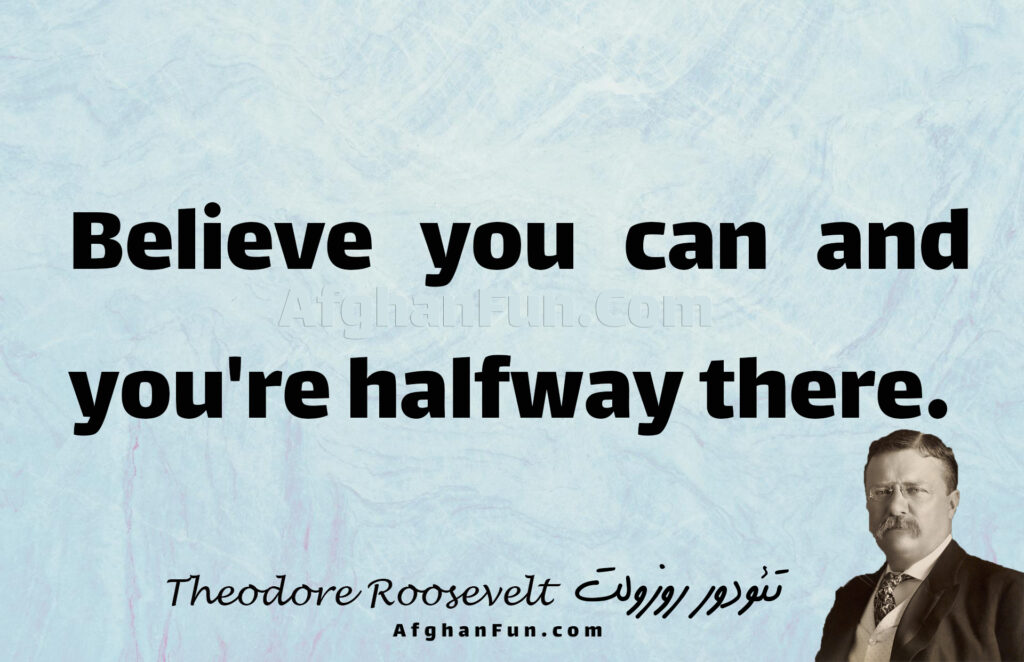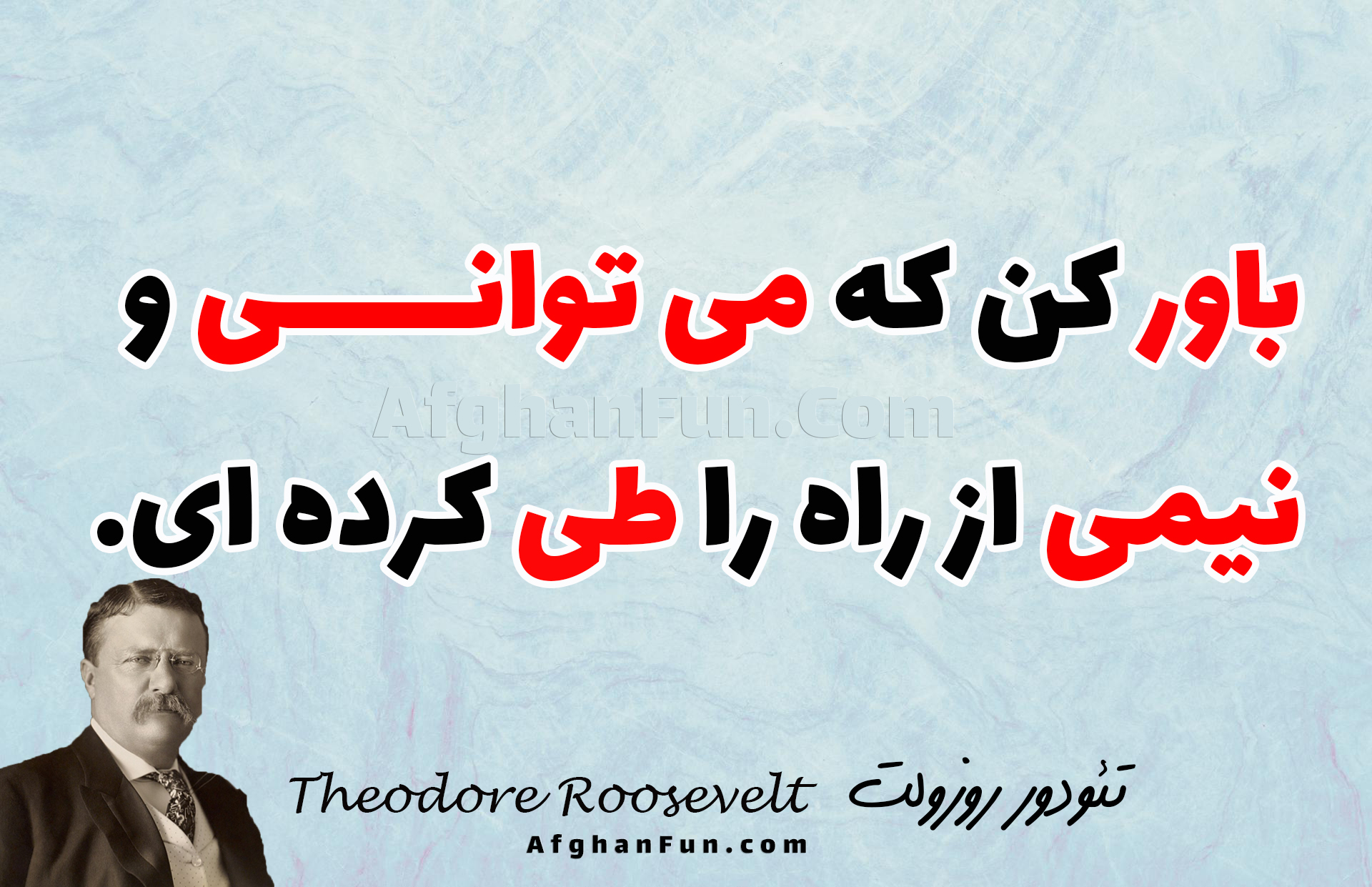
Believe you can and you’re halfway there.
Theodore Roosevelt
Бовар кунед, ки шумо метавонед ва шумо дар нисфи роҳ ҳастед.
Теодор Рузвелт
Ин ҷумла таъкид мекунад, ки боварӣ ба худ ва ба қувваҳои худ, қадами аввалин ва муҳимтарин ба сӯи муваффақият аст. Вақте ки мо ба худ бовар дорем, гӯё нисфи мушкилот ва монеаҳоро паси сар карда бошем. Боварӣ ба худ барои мо нерӯ ва ҳавасмандӣ мебахшад, ки дар роҳи худ устуворона пеш равем ва ба ҳадафҳои худ бирасем.
Бовар кардан ба худ на танҳо як амал, балки эътиқоди қавӣ ба он аст, ки мо метавонем дар ҳама ҳолатҳо ғолиб бошем.
باور کن که می توانی و نیمی از راه را طی کرده ای.
تئودور روزولت
این جمله به ما میگوید که ایمان به خود و باور به تواناییهایمان، اولین و مهمترین قدم برای رسیدن به موفقیت است. وقتی به خود باور داشته باشیم، انگار نیمی از مشکلات و موانع را پشت سر گذاشتهایم. اعتماد به نفس به ما انگیزه میدهد که به مسیر ادامه دهیم.
صدق أنك تستطيع، وقد قطعت نصف الطريق.
ثيودور روزفلت
هذه العبارة تُبرز أهمية الإيمان بالنفس وقدراتنا، فهو الخطوة الأولى والأهم نحو النجاح. عندما نؤمن بأنفسنا، فكأننا قد تجاوزنا نصف العقبات والصعوبات. الثقة بالنفس تمنحنا الدافع لمواصلة الطريق.
The quote “Believe you can and you’re halfway there” is attributed to Theodore Roosevelt, and it encapsulates a powerful psychological and motivational principle. Let’s break it down step by step to understand its deeper implications.
1. The Power of Belief:
Core Message: At its heart, the quote is about the importance of self-belief as the foundation of any successful endeavor. Believing in yourself is not merely a passive feeling, but an active choice that influences your actions and mindset.
Psychological Insight: The idea that belief is central to success is well-supported by psychological theories such as self-efficacy (introduced by psychologist Albert Bandura). Self-efficacy is the belief in one’s ability to achieve specific goals. People with high self-efficacy are more likely to take initiative, persist in the face of challenges, and ultimately succeed. In other words, believing in your ability to achieve something significantly enhances the likelihood that you will follow through with the necessary actions.
2. “You’re Halfway There”:
Symbolic Halfway Point: The phrase “you’re halfway there” is symbolic and emphasizes that belief in yourself is not just a passive step; it’s an active driver that propels you forward. The idea is that without self-belief, it’s difficult to even begin the process. When you believe you can succeed, you’re already on your way to success, because belief generates momentum.
Motivational Aspect: This part of the quote also serves as a motivational tool. It encourages individuals to take the first step, which is often the hardest. If you believe in your potential, the path ahead, while challenging, will feel more surmountable. The quote suggests that a large portion of the battle is won mentally before you even begin the physical or practical work.
3. Mental and Emotional Resilience:
Overcoming Doubt: One of the major barriers to success is self-doubt. Belief in yourself helps to overcome this barrier. In moments of doubt or difficulty, this quote acts as a reminder that the mental victory—believing that you can overcome obstacles—is crucial to pushing through the tough moments.
Emotional Preparation: Belief also means emotional readiness. When you trust in your ability, you become more resilient to setbacks. You can fail and learn from failure without losing faith in your ultimate capacity to succeed. The quote suggests that you don’t need to have all the answers upfront, but you do need the emotional and mental readiness to take action despite uncertainty.
4. Self-Actualization and Growth Mindset:
Growth Mindset: This quote aligns with the concept of a “growth mindset,” popularized by psychologist Carol Dweck. People with a growth mindset believe that their abilities can be developed through effort, learning, and perseverance. By “believing you can,” you embrace the idea that challenges and obstacles are part of the learning process, not indications of your limitations.
Self-Actualization: In a more existential sense, the quote also resonates with the idea of self-actualization—the process of realizing and fulfilling one’s potential. Belief in your abilities is often the first step toward actualizing your highest potential. The belief that you can succeed is the spark that ignites the journey of personal growth.
5. The Role of Motivation and Action:
Activating Action: Belief alone is not enough, but it is the prerequisite for action. You can’t make progress without taking steps toward your goals, and belief is what drives you to take those steps. Without belief in your capacity, there’s no incentive to act. Therefore, “halfway there” is an acknowledgment that belief is a starting point, but it should eventually lead to real-world effort and commitment.
Positive Feedback Loop: When you believe you can succeed and take action, small successes along the way reinforce your belief, creating a feedback loop of motivation and accomplishment. The initial belief serves as the foundation upon which further success is built.
6. Philosophical Implication:
Human Agency: Philosophically, the quote highlights the power of human agency—the ability of individuals to act in their own interest, control their actions, and influence the outcomes of their lives. It suggests that success is not simply a matter of external circumstances but largely shaped by internal factors, particularly your beliefs and attitudes toward challenges.
Optimism vs. Pessimism: Believing in your capacity to succeed positions you on the optimistic end of the spectrum. Optimism, in this case, is not about blind hope but about a realistic recognition of your ability to shape outcomes through effort and resilience. This mindset often leads to greater success than a pessimistic view that emphasizes limitations and the inevitability of failure.
7. Implication for Leadership and Influence:
Empowering Others: The quote also serves as a leadership principle. A good leader doesn’t just give instructions or set goals—they inspire belief. Leaders who can instill belief in their teams or followers enable them to achieve more than they might have otherwise thought possible. In this sense, belief becomes a tool of empowerment.
Conclusion:
In summary, “Believe you can and you’re halfway there” is a statement about the central role that self-belief plays in the achievement of any goal. It underscores the power of mindset and psychological preparedness, emphasizing that success is as much about overcoming mental barriers as it is about taking practical steps. The quote serves as a reminder that belief in your potential not only drives action but shapes how you perceive and respond to challenges, making it an essential component of personal growth and achievement.
Theodore Roosevelt Jr. (October 27, 1858 – January 6, 1919), was the 26th president of the United States, serving from 1901 to 1909. He previously was involved in New York politics, including serving as the state’s 33rd governor for two years. He was the vice president under President William McKinley for six months in 1901, assuming the presidency after McKinley’s assassination. As president, Roosevelt emerged as a leader of the Republican Party and became a driving force for anti-trust and Progressive policies.
Roosevelt assumed the presidency aged 42, and is the youngest person to become U.S. president. As a leader of the progressive movement, he championed his “Square Deal” domestic policies, which called for fairness for all citizens, breaking bad trusts, regulating railroads, and pure food and drugs. Roosevelt prioritized conservation and established national parks, forests, and monuments to preserve U.S. natural resources. In foreign policy, he focused on Central America, beginning construction of the Panama Canal. Roosevelt expanded the Navy and sent the Great White Fleet on a world tour to project naval power. His successful efforts to end the Russo-Japanese War won him the 1906 Nobel Peace Prize, the first American to win a Nobel Prize. Roosevelt was elected to a full term in 1904 and groomed William Howard Taft to succeed him in 1908.
Roosevelt grew frustrated with Taft’s brand of conservatism and tried, and failed, to win the 1912 Republican presidential nomination. He founded the new Progressive Party and ran in 1912; the split allowed the Democratic Woodrow Wilson to win. Roosevelt led a four-month expedition to the Amazon basin, where he nearly died of tropical disease. During World War I, he criticized Wilson for keeping the U.S. out; his offer to lead volunteers to France was rejected. Roosevelt’s health deteriorated and he died in 1919. Polls of historians and political scientists rank him as one of the greatest American presidents.











